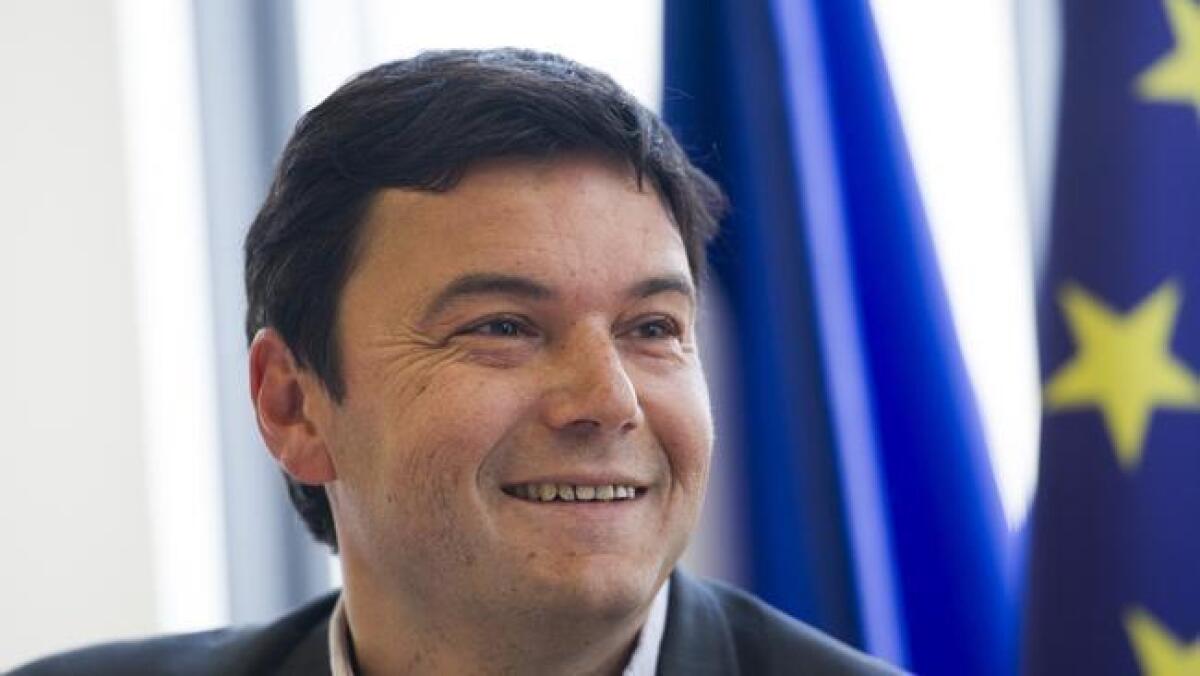Cannes: Thomas Piketty, movie star?

- Share via
Reporting from CANNES, France — Thomas Piketty’s “Capital in the Twenty-First Century” is many things: a global bestseller, a cultural lightning rod, an academic game-changer.
What it has not been seen as, at least so far, is a potential movie.
A couple of New Zealand filmmakers hope to change that. Producer Matthew Metcalfe has acquired the rights to the French economist’s 2013 book and hired director Justin Pemberton (the energy-world exploration “The Nuclear Comeback”) to direct a documentary adaptation of it. On Friday at the Cannes Film Festival, the pair unveiled their plans for the film, with the participation — and appearance — of Piketty himself.
FULL COVERAGE: 2016 Cannes Film Festival
“My first reaction was a little skeptical too,” said Piketty, as he sat in a suite for the New Zealand film commission here Friday afternoon, anticipating some reader reaction. “I thought, ‘Would this just be a series of interviews with economists?’ But Matthew really convinced me this could be done in a visual manner. And I thought, ‘If it helps people buy the book — or finish the book — then it was a good thing.’ ”
At its most basic, Piketty’s book laid out a novel argument for why wealth inequality was built into the modern capitalist system — basically, that it was the result of the return of capital dwarfing economic growth. It then proposed a set of taxes that could correct those imbalances and stave off all kinds of potential turmoil, while acknowledging the political difficulties of the task.
Several years ago, Metcalfe was one of many people who was simply a fan of “Capital.” But the producer, who had made such movies as the Everest doc “Beyond the Edge,” began to think of ways it could become a movie. He contacted Piketty via his website and then spent the next few months convincing him and his French publisher this was a worthy undertaking.
Key to his pitch were those visual aspects. He, and later Pemberton, believed that the movie could work if the talking heads were minimized and other, more pop culture friendly portrayals used in their place.
The duo on Friday said that, to explain the ideas, they wanted to paste together clips and other archival material in the hope of better dramatizing the story. (They cited Errol Morris’ “The Fog of War” and Charles Ferguson’s “Inside Job” as reference points.)
“Look at even something like Fred Flintstone, whose boss at the quarry lived in a house just a little bigger than his,” Metcalfe said. “And then look at how our view of capital changed years later, with [The Simpsons’] Montgomery Burns, where he’s living in a giant house with vicious dogs and killer bees.
“The reason pop culture shows characters like this,” he continued, “is because they reflect us when we don’t even know it reflects us. We can use them to tell our story.” (Rights will be a hurdle, but one step at a time.)
Piketty, meanwhile, will be featured in the film. The author likely will sit for several interviews, guiding viewers through his ideas, though Pemberton said he didn’t want to over-rely on the author, and Piketty said he really didn’t want to be over-relied on. “I’ve done a lot of interviews. Most of them are on YouTube,” he said dryly.
Pemberton said he didn’t see the movie as a replacement for the book, but he thought it could serve as a necessary complement, particularly given how daunting the “Capital” reading experience could be.
“Think about all those people who didn’t buy the book, or all those people who bought the book and almost read it. I mean, it’s almost 700 pages,” the director said. “The audiobook is 26 hours. That’s a serious investment.
“This is a way for a lot more people to understand its ideas.” Math, he said, would be kept to a minimum.
Added the director: “It’s a challenge, but an exciting challenge.”
Financing is in place via an assortment of film funds and private investors, the filmmakers said, and the hope is to begin shooting this summer. The film could be ready as early as the end of 2017.
Narrative adaptations of nonfiction books are not new: “Moneyball” did it to great effect five years ago, and “The Big Short” a few months ago further proved the Michael Lewis rule. (Piketty, incidentally, says he hasn’t seen “The Big Short.”) But documentaries centering on economic books, even accessible ones, can be trickier affairs — a cinematic take on “Freaknomics” a few years ago, for instance, largely didn’t work.
The gold standard of eat-your-vegetables filmmaking is, of course, “An Inconvenient Truth,” though that call to arms came with a prominent personality at its center and was the kind of wonky success not easily duplicated.
Then again, wealth inequality is in the air this presidential campaign season. And if the movie doesn’t work, it likely won’t erode interest in or credibility of the book anyway.
“It’s a risk,” Piketty said. “But in the end, I think it will be one worth taking.”
MORE:
Woody Allen addresses Ronan Farrow fallout (sort of)
Jodie Foster returns to Cannes, this time on a mission
Chloë Sevigny seeks a new chapter at Cannes, via a cat
Twitter: @ZeitchikLAT
More to Read
Only good movies
Get the Indie Focus newsletter, Mark Olsen's weekly guide to the world of cinema.
You may occasionally receive promotional content from the Los Angeles Times.











